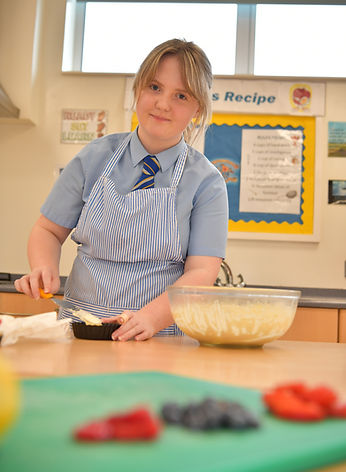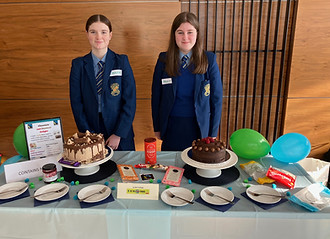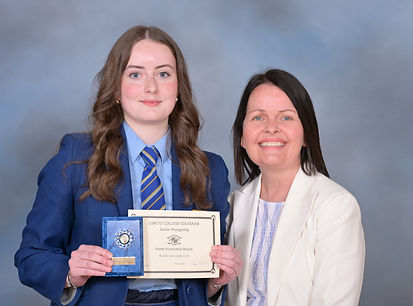

Head of Department:
Mrs S McNicholl
Teaching Staff:
Mrs S McNicholl
Mrs M McAleese
Mrs C Mullan
Mrs E Niblock
Mrs M Finlay
Technician:
Mrs Z McMaster
Home Economics is an integrated subject where the inter-relationship between diet, health, family, home and resources are addressed in both practical and theoretical contexts. Home Economics involves pupils in the study of nutrition, food choice, diet and health within the context of home and family. At each Key Stage, the course offered is designed to encourage pupils to think critically, make informed choices, develop practical food skills and manage resources so they are enabled to lead effective lives as individuals and family members as well as contributors to society
KS3
At Key Stage 3, Home Economics helps prepare young people for independent living. It is a practical subject that can promote and enhance the wellbeing of individuals, families and communities through understanding food choice, nutritional health, consumer issues and relationships. This subject strand aims to equip pupils with the knowledge, skills and values that will help them to make appropriate lifestyle choices. During Years 8 to 10 all pupils have the opportunity to develop and improve their practical skills as they prepare and cook dishes typically on a fortnightly basis.

Alannah Boyle and Molly Hanna represented the school at the Causeway Coast and Glens Bake Off
Mrs McNicholl presents the academic award for Home Economics at KS3 to Clare Mullan 2024

Mrs McNicholl presents the academic award for Home Economics at KS3 to Aoibh Darragh 2025

KS4
The knowledge, understanding and skills developed through the delivery of the Programme of Study at Key Stage 3 are consolidated and extended through Key Stage 4 where we offer CCEA GCSE Home Economics: Food and Nutrition and Child Development, and OS Studies, Contemporary Cuisine. At Key Stage 5 Nutrition and Food Science is delivered by the department.
GCSE Home Economics: Food and Nutrition
The Food and Nutrition specification encourages students to develop knowledge and understanding of the science behind food. Specific topics such as food provenance, food processing and production, macronutrients and micronutrients, government nutritional guidelines, and food safety are taught. Students develop practical skills in food preparation, cooking and presentation.
GCSE Home Economics: Child Development
Child Development is a broad, coherent course on the development of babies and small children (0–5 years). It encourages students to develop knowledge, understanding and skills, including practical skills, by focusing on the key areas of pregnancy, childbirth and caring for a newborn baby; the responsibilities involved in parenting and other family roles; and the social, physical, intellectual, communication and emotional development of small children, including their dietary, health and educational needs.
OS Studies: Contemporary Cuisine - Patisserie and Baking
Contemporary Cuisine is occupational pathway designed to be accessible to a wide range of learners of all abilities. Occupational Studies will appeal to learners who are better suited to developing their skills in a more practical, occupationally orientated environment.
It provides a hands-on approach to learning giving pupils the opportunity to learn for work, through work and about work, with real outcomes that will give them skills for life. It enables learners to engage actively in work-based learning within coherent occupational contexts and reflect on their learning. Pupils prepare many dishes throughout the two years including soups and starters; mains and desserts in year 11, continuing with breads, scones, cakes and biscuits in year 12.

FutureChef Competition

Local Heat Winner Zuzanna with guest chef’s including Paula McIntyre

Zuzanna Urbanek at the NI FutureChef Finals

Zuzanna Urbanek, Graham Henry, Mrs Niblock at the Northern Ireland Spring Board FutureChef Final
Post 16
The Key Stage 4 options mentioned above are popular choices at Loreto College Coleraine and follow through to A ‘Level study of Nutrition and Food Science Health and Social Care. The course focuses on good nutrition as an important part of leading a healthy lifestyle. Eating healthy food can help to reduce the risk of chronic illness and promote overall health. This is done by learning about macronutrients and micronutrients, and the study of nutritional requirements and current dietary recommendations for each life stage. In Students also investigate current research on diet, lifestyle and health and may choose to examine consumer behaviour when making food purchasing decisions and consider the issues and implications of consumer food choice (Food Security and Sustainability). Alternatively, they might explore securing a safe food supply from the primary producer to the consumer (Food Safety and Quality).
This course provides a suitable basis for further study by offering progression to academic courses at university level as well as providing a basis for those seeking employment in a wide range of settings such as the caring professions, catering, childcare, food production and retailing.
The Home Economics Department has two full time members of staff. Mrs McNicholl and Mrs McAleese, and one-part time member Mrs I Cunning. Mrs McClure provides technical support for the Department. Through their commitment and enthusiasm, the subject is delivered in a stimulating and vibrant manner using creativity and innovative ideas in the delivery of the subject. At Key Stage 3 the pupils have practical cookery regularly giving them hands on experience and an opportunity for achieving a successful end product very quickly.
Outside speakers, demonstrations, ICT, videos etc. are all used to add to the diversity of the delivery of the subject. This is continued at Key Stage 4 (Food and Nutrition and Child Development and Contemporary Cuisine) and Post 16 (Nutrition and Food Science) making Home Economics a popular subject choice. The department is well resourced with two purpose built classrooms which are equipped to a high standard and aesthetically display many examples of students’ work. Within the department the opportunity is provided for students to take part in competitions to enhance their experience in the wider context.












